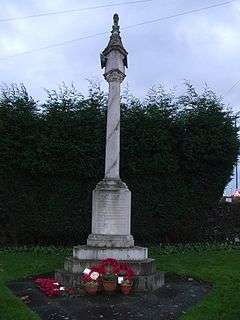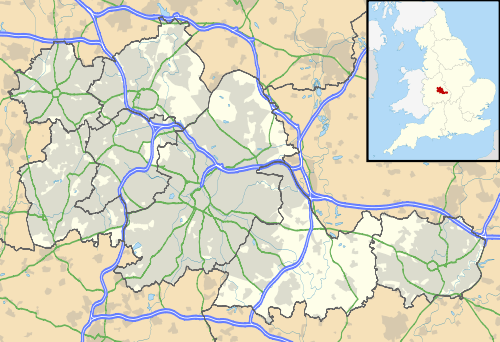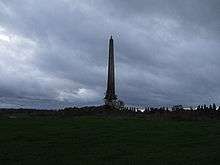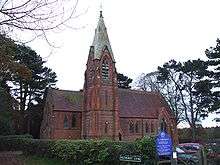Hockley Heath
| Hockley Heath | |
 The War memorial, Hockley Heath |
|
 Hockley Heath |
|
| Population | 2,038 (2011 Census) |
|---|---|
| – London | 112 mi (180 km) |
| Metropolitan borough | Solihull |
| Metropolitan county | West Midlands |
| Region | West Midlands |
| Country | England |
| Sovereign state | United Kingdom |
| Post town | SOLIHULL |
| Postcode district | B90-B95 |
| Dialling code | 01564 |
| Police | West Midlands |
| Fire | West Midlands |
| Ambulance | West Midlands |
| EU Parliament | West Midlands |
| UK Parliament | Meriden |
| Website | http://www.hockleyheath-pc.gov.uk/ |
|
|
Coordinates: 52°21′21″N 1°46′39″W / 52.3559°N 1.7774°W
Hockley Heath is a village and civil parish in the Metropolitan Borough of Solihull, West Midlands, England. The parish is to the south of the West Midlands conurbation,12 miles (19 km) from Birmingham 5.5 miles (8.9 km) from Solihull and 12.5 miles (20.1 km) from Stratford-upon-Avon. Until recently, as well as Hockley Heath village (which is at the extreme south-eastern corner of the parish), it included Cheswick Green, Dickens Heath, Tidbury Green, Salter Street, and Whitlock's End. However following a community governance review, on 31 March 2009 the former Hockley Heath Parish Council was abolished and on 1 April 2009 four new parish councils were created. The new parishes follow the old ward boundaries for the Hockley Heath Parish and each parish now has a parish council. According to the 2001 census, the parish had a population of 6,771, being measured at the 2011 Census as 2,038.[1]
History

Historically part of the parish of Hampton in Arden, the earliest reference here is to Nuthurst,situated south of the present day village. Dugdale found no mention of it before the reign of Henry III (1216–72)[2] but it has been identified with the woodland 'aet Hnuthyrste' given with Shottery to Worcester Cathedral by Offa c. 705.[3] Werfryd, Bishop of Worcester, in 872 granted to Eanwulf, the Kings thane, land at Hnuthyrst for four lives, with reversion to the monastery of Stratford. After the Norman Conquest the name usually appeared as Notehurst, but gradually reverted to its present and original spelling. Hockley Heath first appeared in the 13th century.[4] It was part of Hampton-in-Arden, and 1/5 knight's fee in Nuthurst was held of Niel de Mowbray c. 1230 and of Roger de Mowbray in 1242. The overlordship descended in this family, being held by Roger de Mowbray at his death in 1297, and by John Mowbray, Duke of Norfolk, in 1432.[3] After the Mowbrays it passed to the Montforts, Hastings and then to the Trussells and it was Sir William Trussell of Nuthurst who informed Edward II of his disposition in favour of his son.[2] By the 18th century it had passed to the Archers of Umberslade Hall and Lord Archer raised an obelisk on the estate, the reason for which is unclear, possibly to celebrate his elevation to the peerage or just, as was the fashion during that period, as a folly.[4]
The village was attacked during the First World War when Zeppelin L 62 bombed the village during an attempted raid on Birmingham but heavy anti-aircraft fire prevented the airship from getting near the city centre. [5]
Governance
Following then creation of the new parish an by an uncontested election on 4 June 2009 the following 5 councillors were elected to the Parish Council, Paul Edward Afford, Stu Barbour, Christopher John Lang, Peter Trengrove Rayson, Assunta Maria Vernon and the chairman, Peter Rayson.[6] Hockley Heath is part of the Dorridge and Hockley Heath ward of Solihull Metropolitan Borough Council and is represented by Mayor Ian Courts and Councillors Andrew Mackiewicz and Ken Meeson all of the Conservative party.[7] Nationally, it is part of the constituency of Meriden whose Member of Parliament is, and has been since 1997, Caroline Spelman of the Conservative party. It is included in the West Midlands electoral region of the European Parliament, the seven members elected in 2014 are; Philip Bradbourn OBE, (who died in December 2014) and Anthea McIntryre (Conservative), Neena Gill and Sion Simon (Labour) and Jim Carver, Bill Etheridge and Jill Seymour (UK Independence).
Notable landmarks

The ecclesiastical parish of Nuthurst cum Hockley Heath was formed in 1878 with the addition of the modern village of Hockley Heath from Tanworth. It lies for the most part between two roads from Henley-in-Arden to Birmingham which meet in the extreme north of the civil parish, where the church of St. Thomas, designed by John Cotton, a red-brick structure in the Early English style, was built in 1879[8] and consecrated on 30 June 1880, having cost £2,500. It was dedicated to St Thomas, as a compliment to Thomas Burman, of Warings Green, who, as the chief subscriber, laid the foundation stone in 1879.[4]
Situated at the junction of the A3400 Stratford on Avon to Birmingham Road and the B4439, known as the Old Warwick Road is the War Memorial to those killed during the two World Wars.
Transport links
The village is situated on the main A3400 Birmingham to Stratford Road, 2.5 miles (4.0 km) south of junction 4 of the M42 motorway affording links to London and other major cities, whilst 2 miles (3.2 km) south of the village there is a junction off the southbound carriageway of the M40 motorway.
The village is on the route of bus services X20 which runs between Birmingham and Stratford-upon-Avon. Additionally service S3 links the village to Solihull via Dorridge. Dorridge Station is the nearest railway station to the village at 2 miles (3.2 km) away with local connections to Solihull, Birmingham and Warwick and main line connections to London Marylebone on Chiltern Railways.
The Stratford-upon-Avon Canal runs through the village and Hockley Heath Wharf, situated to the rear of The Wharf Public house, meant it became one the Arden villages which later became a convenient stopping off point for users of the canal.
The village was formed as a horse changing point on the 25-mile journey between Birmingham and Stratford-upon-Avon. A public house called "The Nag's Head" used to stand in the place where the stables are thought to have once stood.
Education
Hockley Heath Primary School is situated on School Road, Hockley Heath, Solihull, West Midlands, B94 6RA
| School | Compulsory education stage | School website | Ofsted details |
|---|---|---|---|
| Hockley Heath Primary School | Primary | Ofsted details for unique reference number 104064 | |
References
- ↑ "Civil Parish population 2011". Retrieved 16 December 2015.
- 1 2 The Antiquities of Warwickshire, William Dugdale, 1656
- 1 2 A History of the County of Warwick: Volume 3
- 1 2 3 In the Forest of Arden, John Burman, 1948
- ↑ "Sitesafe UXO Desk Study" (PDF). Birmingham City Council. Retrieved 21 April 2012.
- ↑ Notice of Election Accessed 17 January 2010
- ↑
- ↑ Nikolaus Pevsner and Alexandra Wedgwood, The Buildings of England, Warwickshire, 1966, ISBN 0-14-071031-0
External links
![]() Media related to Hockley Heath at Wikimedia Commons
Media related to Hockley Heath at Wikimedia Commons